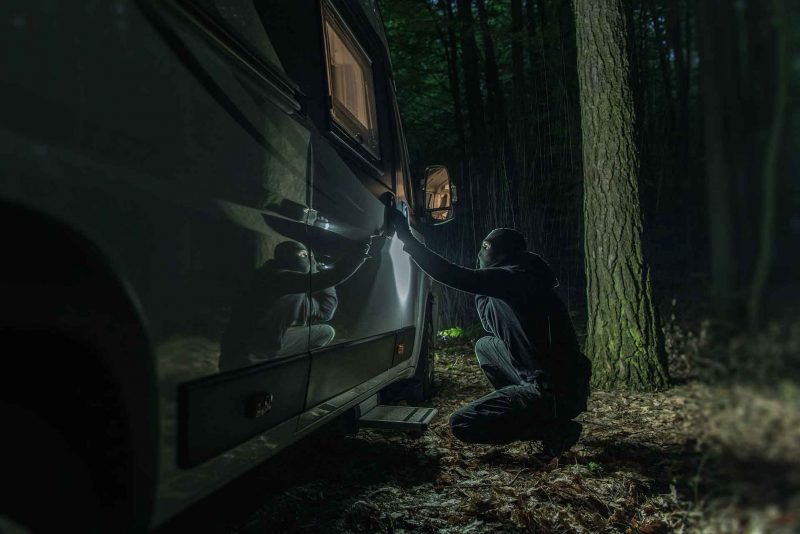For decades, many RVers and nomads have used public lands for parking their RVs to boondock in epic locations. However, RVing has changed recently, increasing the traffic and popularity of these campsites. As a result, you’ve likely noticed the high amount of news stories sharing how dangerous the lifestyle can be to many RVers.
So is boondocking getting more dangerous with the rise of RV living? Let’s look and see!

What Is Boondocking?
Boondocking is a camping style where you use a camper or other RV for camping on public lands temporarily. These adventurers often use grounds the US Forest Service or the Bureau of Land Management maintain. While most of these lands are west of the Mississippi River, thousands of potential campsites are free or require an inexpensive permit.
This camping style is entirely unlike visiting an established campground. Anyone wanting to enjoy boondocking must be self-sufficient with power, water, and waste disposal.
These campsites are typically nothing more than a spot to set up camp. You won’t find a power pedestal, dump station, or water connection.
Is Boondocking Safe?
While there have been a handful of trending stories in recent years regarding boondocking incidents, the style of camping is incredibly safe. You’re typically in no more danger than in any other camping situation or outdoor activity.
Do wild things happen while boondocking? Absolutely. However, unsafe conditions occur in campgrounds, hotels, and many other places where people temporarily stay, too.
HOT TAKE
Don’t Blame Us; 7 Awful Boondocking Spots in California
Is Boondocking Getting More Dangerous With the Rise of RV Living?
Boondocking doesn’t appear to be getting any more dangerous. However, with the rise of RV living and social media, news and events travel faster. We’re more likely to hear and read about events that we otherwise wouldn’t have known about before.
The rise of RV living is causing public lands to see more heavy use. Some of the best boondocking spots in the past now see many RVs.

However, not everyone living in an RV is an online influencer or family vlogger. Some people choose RV living out of desperation and may not have a clean record with the law. You never know who will set up camp next to you in some of these locations. Keep in mind, there are some things you can do to stay safe while boondocking.
How Do You Secure Your RV While Boondocking?
People new to boondocking often balk at leaving their precious and expensive RV out of sight for even a short period. However, you seldom hear of an RV getting stolen, and you rarely hear of people breaking into RVs while boondocking. Securing your RV can help minimize the chances of someone messing with it while you’re away.
A hitch lock is one of the best ways to secure your RV. These go over the kingpin or coupler of your RV and prevent anyone from quickly hitching up and towing your RV.
While thieves could cut through these devices with the right tools, they’ll typically pass on anything that’s not an easy target. So ensure you have a hitch lock and use it when boondocking.
It’s also best to always lock your windows, doors, and storage compartments on your RV. They may not tow your RV away, but they could walk off with your gadgets and gear at your campsite.
You should avoid leaving bikes, kayaks, and generators out while you’re away. By keeping a tidy camp, so you can come and go without spending a lot of time packing up.
How Do You Stay Safe While Boondocking?
Whether you’re new to boondocking or want to improve your safety, there are a few things you can do to stay safe while boondocking. Here are a few simple things you and your fellow campers can do while camping on public lands.
Observe Your Surroundings
It would help if you were observant of what’s happening around you. You won’t notice suspicious activity or individuals if you’re not aware of your surroundings.
Look for signs of illegal or dangerous activity. Not everything that poses a danger while boondocking relates to humans.
You need to be aware of potentially dangerous wildlife. Look for tracks, scat, snake skins, or other signs of wildlife activity. If camping in bear country, you should always practice bear-safe practices and assume that an encounter with a bear or other hazardous wildlife is likely. This will help reduce the chances of attracting wildlife to your campsite.
In addition, nature can be incredibly unpredictable, no matter where you’re camping. While campground management will often tell those staying in their campsites that severe weather is on the way, that won’t be the case when boondocking. You’ll need to be aware of the weather and any potential hazards it might bring.
Listen to Your Gut
Trust your instincts if you feel unsafe or uneasy about a boondocking spot. It’s better to play it safe than to put yourself in a risky situation.
While it may be incredibly inconvenient, no boondocking site is worth putting you or anyone camping with you in danger. Cut your trip short or find a different place to stay where you feel safer.

Lock Your RV
It’s not enough to have locks on your RV; you must use them. It always amazes us to hear of RVers experiencing thefts, even at campgrounds or while their rig sits in storage. Most failed to use the locks on their RV.
We recommend replacing the cheap door lock the manufacturer installed on your RV with an RV Lock. These upgraded locks allow you to secure your entire RV with a button.
If you’re planning to leave any valuables at your campsite, you’ll want to lock them up, too. Use chains and padlocks to secure them.
While this may not prevent all thefts, it will at least cause the thief more of a hassle. If a thief is determined to walk away with your stuff, they’ll find a way to make it happen.
Tell Friends or Family Where You’ll Be
You should always communicate with your friends and family regarding your whereabouts, especially if you plan to spend time in remote areas. Despite what your cell phone provider may tell you, cell coverage can still be pretty spotty in many parts of the country.
Creating a shareable calendar with your travel plans and itinerary is a good idea if you’re planning to spend a generous amount of time boondocking. However, you should only share this with loved ones and those you trust to know your exact location. This will help them to have an idea of where to look for you in case of an emergency.

Carry Emergency Numbers With You
It’s best to look up and store emergency numbers for the local authorities while traveling. You never know when you’ll need to call the fire department or other emergency services.
In most cases, it might be better to dial 911. However, due to cell networks and the way they route calls, this could cause a delay in help arriving when you need it.
Where Is the Best Place to Live in an RV?
If you’re planning to live in an RV, the best place will likely be an RV park that allows long-term stays. RV parks usually have everything an RVer needs for power, water, and sewage. You won’t have to worry about managing your power or water usage and tracking down a place to dump your tanks.
You also won’t worry about packing up your RV and moving it frequently to avoid violating stay limits. Many people can comfortably spend weeks, months, or years in a long-term RV site.
Is Boondocking Worth It?
There’s a reason why boondocking has become increasingly popular in recent years. The massive boom in the RV industry has made it challenging to book campsites as availability is severely limited. Even if you can snag a reservation, you’ll have a crowded and noisy campground.
Boondocking is an excellent way to enjoy an open space while maintaining privacy. It’s our favorite way to camp and enjoy our time RVing.
Where will you go on your next boondocking trip?
If You Want the Latest Travel News, Join Our Mailing List
Don’t rely on biased RV industry news sources to keep you informed. Stick with Nomadic News. We publish articles and breaking stories that matter to you every weekday.










